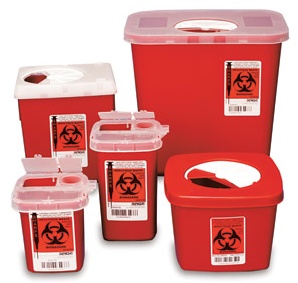Reliable Medical Waste Disposal Services: Partnering for a Cleanser Setting
Navigating Medical Waste Disposal: Important Solutions for Health Care Facilities
In the elaborate landscape of healthcare operations, the administration of clinical waste is a critical aspect that demands thorough attention. Healthcare centers, whether big medical facilities or tiny facilities, are turned over with the responsibility of handling, treating, and throwing away a vast array of medical waste streams. The complexities associated with browsing via the regulatory requirements, ensuring proper waste partition, and performing risk-free collection and transportation procedures are extremely important. Recognizing the vital services that support clinical garbage disposal is not just an issue of conformity but likewise an essential part in protecting public health and wellness and environmental well-being. The intricacies of this process are important for healthcare centers, and the competence used in this world plays a crucial function in preserving the stability of healthcare systems.
Regulatory Conformity Support
For healthcare facilities, guaranteeing regulative compliance assistance is important to keep correct handling and disposal of medical waste. By partnering with regulatory compliance professionals, healthcare facilities can stay up-to-date on developing regulations, minimize risks connected with incorrect waste disposal, and ultimately add to a safer and much more lasting atmosphere for all.
Waste Partition Support

Medical care facilities should offer clear standards and training to team on how to segregate waste successfully. This consists of dividing basic waste from harmful products such as sharps, transmittable waste, pharmaceuticals, and chemical waste. Color-coded containers, tags, and signage are typically utilized to help in waste partition practices. Routine audits and tracking of waste segregation processes are important to determine any type of problems and make needed renovations.
Collection and Transportation Solutions

Appropriate collection and transportation services are vital components of the medical garbage disposal process in healthcare facilities. These solutions make sure that dangerous materials are managed safely and in compliance with laws to protect both the environment and public health. Medical care facilities depend on specialized waste administration firms to give effective collection and transportation services tailored to their requirements.
Clinical waste collection includes setting apart various sorts of waste at the point of generation, using color-coded bags or containers to distinguish in between basic, hazardous, pharmaceutical, and various other waste streams. Trained employees need to perform this job to avoid contamination and ensure appropriate disposal. When gathered, the waste is transferred in committed cars outfitted to take care of harmful materials safely. These lorries abide by stringent safety and security requirements and comply with marked routes to qualified treatment facilities for disposal via methods such as landfilling, incineration, or sterilization.
Therapy and Disposal Solutions
In the realm of medical waste disposal for healthcare centers, after the important phase of collection and transport services, the emphasis changes towards executing efficient treatment and disposal options. Therapy services often involve processes such as autoclaving, which uses vapor under stress to sanitize the waste.
Disposal options encompass the last step in the clinical waste monitoring process. Reusing and source recovery are also acquiring traction as sustainable disposal alternatives for specific kinds of medical waste image source materials.
Efficient therapy and disposal services are critical in ensuring conformity with guidelines and securing public health and wellness and the atmosphere. Medical care facilities must meticulously examine and select appropriate approaches that straighten with their waste monitoring goals and sustainability efforts.
Personnel Training and Education

To properly manage medical waste disposal in health care centers, extensive team training and education and learning play an important duty in making sure adherence to regulatory demands and maintaining a risk-free setting. Correct training equips staff with the understanding and abilities required to handle different kinds of medical Source waste, segregate them correctly, and package them securely for disposal. By educating workers on the risks connected with inappropriate handling of clinical waste, facilities can lower the likelihood of accidents, contamination, and regulative infractions.

Final Thought
Finally, health care centers rely upon necessary medical garbage disposal solutions to guarantee regulatory compliance, proper waste partition, secure collection and transport, efficient treatment and disposal, along with team training and education. These services play a vital function in keeping the health and wellness of both health care workers and the basic public, highlighting the significance of proper management of clinical waste in healthcare setups.
For healthcare centers, making certain regulatory compliance assistance is necessary to maintain proper handling and disposal of clinical waste. Waste partition involves classifying various types of clinical waste to ensure ideal handling, treatment, and disposal. This includes separating general click this link waste from unsafe products such as sharps, infectious waste, drugs, and chemical waste.Medical waste collection involves setting apart different kinds of waste at the factor of generation, utilizing color-coded bins or bags to identify between general, dangerous, pharmaceutical, and other waste streams.In the realm of clinical waste disposal for healthcare centers, after the important stage of collection and transportation services, the emphasis shifts towards carrying out efficient therapy and disposal services.